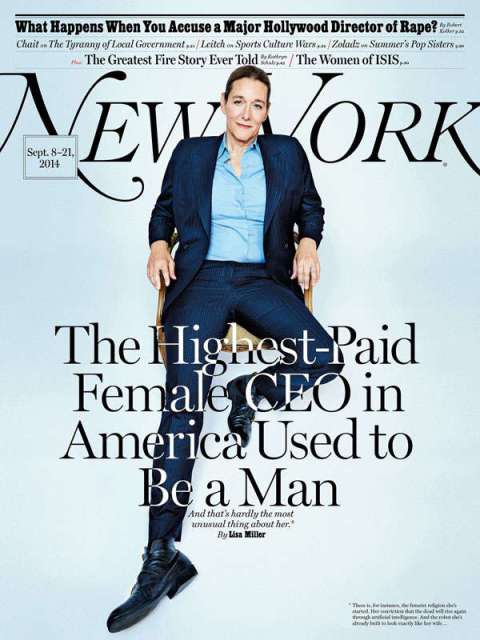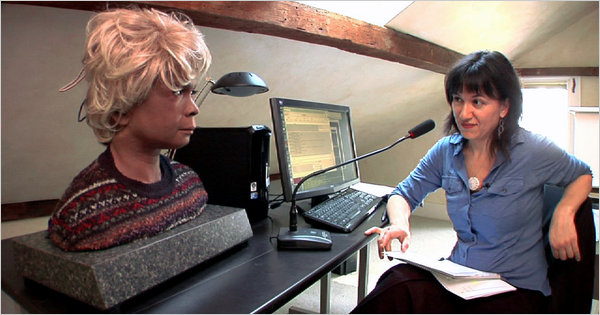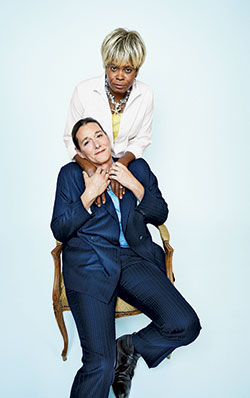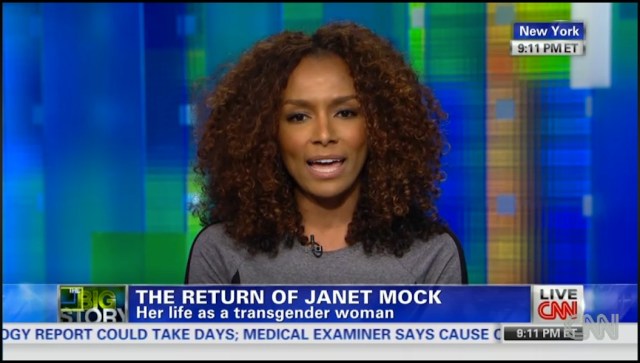by Mari and Mey
Being a trans woman is complicated. It can seem like every day you have to deal with things that are anything but black and white. There’s the media’s portrayal of trans people, terminology, the entire concept of “passing” — and that’s just scratching the surface. Luckily, you have Mari and Mey to talk out their conflicted feelings on these things.
This time, we took a look at the recent front page story in New York Magazine about CEO and trans woman Martine Rothblatt. The headline and the article repeatedly talk about how she “used to be a man” and use other language that’s often considered problematic within the trans community. We sat down and talked about this article and our feelings on the topic of trans terminology and language as a whole.
Mari: So, from a general viewpoint, I think a lot of the phrasing and terminology used in the article is really problematic. Firstly, while they managed to avoid the more problematic “was born a man” (because even men aren’t born men… no one springs forth from the womb as an adult), “was born male” is still a phrase I’m not a big fan of. It’s generally become much more commonplace to use the phrase “assigned male at birth” because so many trans women feel the were never male, never boys. It’s common enough that some trans people even prefer “coercively assign ___ at birth” because they feel their assigned gender was wrong forced on them. The magazine also consistently uses the very dated phrase “sex reassignment surgery,” which is problematic for the same reason. If you’re attempting to be at all trans sensitive, “gender confirmation surgery” or “gender affirming surgery” is definitely preferred.

It also bothers me immensely that they frame the entire article with “what sets Rothblatt apart from the other women on the list is that she — who earned $38 million last year — was born male.”…as if absolutely none of her other accomplishments and amazing life journey can trump the fact that she’s trans. Being trans must inherently be the most interesting or unique thing about her. I really find that offensive.
Mey: Yeah, I definitely agree. This article as a whole seemed as if they got their trans terminology and understanding of how to talk about trans women from 1995. And like you said, even though the sub-headline says “and that’s hardly the most unusual thing about her,” meaning her being trans, but they still thought that that was unusual enough to be the focus of the headline and in many ways, the article. Like, she has a robot version of her wife, she started her own religion, I feel like even being the founder of Sirius Radio is in many ways more interesting than being trans!

And even just the headline on the front page of the magazine declared in big bold letters that Martine Rothblatt “used to be a man,” under many circumstances would be incredibly offensive. But then, this brings up my first conflicted feeling. What if Martine herself uses that terminology? What if she sees herself as formerly being a man and having her sex reassigned through surgery? Does her personal language preference trump what is considered to be the non-offensive way to talk about trans women?
Mari: I tend to think it does. We all have the right to self-define, and there’s no such a thing as a “standard” way to be trans. However, I feel like a better researched writer who took the time to be aware of sensitive to the complicated nature of the trans community would have made that clearer in her presentation of Martine’s story… that she was using Martine’s words and language out of respect.
Mey: Yeah, that’s how I feel, and that’s what I was thinking. There should have been like, a little paragraph saying something like, “many trans women find this language problematic, or even offensive, and although Rothblatt sees herself as formerly being a man, many other trans women were assigned male at birth, but never consider themselves having been boys or men.”
But then there were other times in the article when it seemed like it was just the writer who was using her own problematic terminology. At one point it said Martine thought of herself as gay, “in the sense of seeing myself as a woman sexually attracted to women” but then later the writer says that Martine is “therefore also, sort of, a lesbian” because she’s married to a woman. If she calls herself gay, attracted to women and a woman, how does that only make her “sort of” a lesbian?

Mari: Agreed. Same goes for the pronoun and name switching when discussing her pre-transition life. Of course, that whole conversation, along with the cliche “before” photo was also, dare I say… tacky? It feels like the writer is lost and fumbling through so much of the piece, especially when discussing gender and transition. It’s like there’s some sort of playbook for how to write about trans people for a cis audience that dates from the 90s that she’s following. And there’s this sentence, which is just… frankly pretty inaccurate: “In the conventional narrative about sex reassignment, a person is so sure from such a young age that he or she inhabits the wrong body that a surgically corrected self is a lifelong dream.” That narrative is SO outdated and generally viewed as downright harmful by many trans folks. As far as I know, the only people who believe in that “conventional narrative” are cis people.
Mey: Yeah, that was another time when I thought this article was written twenty years ago.
But back to Martine. What if she had said some even more problematic or offensive things regarding how she self identifies as a trans woman? What if she (or any other trans woman being interviewed) said something about how “as a trans woman, I’m not a real woman” or something, which at times I felt this article was close to doing. Would there be different rules then?
I feel like a lot of people confuse gender and gender presentation in these discussions. Like, even back when I was presenting as a guy, and my gender presentation was “boy” or whatever, I still consider myself a girl. My outward appearance and how people perceived me did not define my gender.
Mari: I’m with you. I think there’s an rather problematic conflation of the ideas of “gender identity” and “gender presentation” under the catch-all of “gender.” And again, if that’s how she were to identify, I believe that’s absolutely her right, and that’s how it should be presented. And those people do exist — they fall into the “gender critical” transgender camp. However, as a writer, I think it’s important to both understand and explain that situation to readers. When you’re delving into trans issues, you have a duty to know the subject matter. And, since the trans community is so small and vulnerable, I think there’s an even bigger need to be aware of how what you’re writing could impact our community and how the cis community perceives it.
Basically, there are ways to respect someone’s individual identity AND still be respectful to the larger community.
Mey: Yes! That was a thought that I had! About how we, as trans women, and trans people in general, are a smaller community and our media representation is even smaller, and so therefore we see every single instance of media representation as reflecting on all of us. And it often does. So I totally agree, that the media needs to be aware of how they portray trans people and what language they use. And I don’t think it’s that difficult. Just a couple sentences saying that this is how Martine talks about her life and gender, but many trans people don’t like or use this terminology.

Also, the article definitely had really weird ideas about gender roles between the two, and again, it confused gender roles with gender. Outside of this article, you mentioned that the New York Magazine piece talks about how Martine ordered too much food and that by the time it got there it was cold, and then her wife swooped in and saved the meal. There’s another part where it says “the guests divide themselves by gender, with Martine remaining at the dining table with the men. Helen and Bina and I gather in the kitchen, where we talk, mostly about family.” So no, it didn’t divide by gender. It seemed the writer just wanted to write a little “the women went to gab in the kitchen while the men stayed and talked about serious things” thing. Again, I think that went back to the idea that the writer didn’t necessarily see Martine as a woman, just as a trans person. And I think it’s mainly about confusing gender presentation and gender roles with gender. There’s nothing about Martine’s lack of makeup or jewelry, or her inability to plan dinner or her liking to talk to men or her sex life that makes her less of a woman or more of a man, but that’s what this article seems to think.
Mari: Yes, it seems like the writer has some vague notions of the existence of non-binary identities. She discusses Kate Bornstein briefly, and drops the word “genderqueer” without any real explanation. It may be that Martine, like so many trans people including myself, identified as non-binary for years before coming out as trans and going through medical transition. It may be that Martine STILL identifies in some non-binary fashion but refers to herself as a woman, especially when dealing with people who are less aware of trans issues. But, those are things that could easily be mentioned or explained in a sentence or two in this very long article without being cumbersome. But, instead, it’s just a mish-mashery of a whole of lots things presented in a murky, frustrating and uninformed-sounding way.
Mey: Wrapping up, it seems to me that with this issue, there is a big generational difference, like there often is with terminology in the queer community. It seems like it’s mainly middle-age and older trans women who use this “used to be a man” or similar terminology. So I wouldn’t be that surprised if it gets more and more rare as time goes on. Especially when we have leaders of the current trans movement, like Laverne Cox on CBS This Morning rejecting the idea that she was born a boy and Janet Mock very famously rejecting the same idea on Piers Morgan.

Also, with regard to the way trans lives are written about, we do see websites, periodicals and other forms of media get called out when they mess up or use problematic language, so I do think people are learning and things are getting better. And with more and more stories about trans people being in the mainstream media, I think that people will be forced to learn the proper terminology. I don’t know, I’m an optimist.
Mari: I think as the sense of community continues to grow with trans people, especially via the Internet, we’ll see some shifts in language continue to happen as we refine how we wish to discuss our lives. For so many years, the language used to discuss trans issues was forced on us by doctors and the cis world. But, over the last 10 years or so, we’ve really started to speak for ourselves and define our own terminology. I think you’re right about the generation difference in how we discuss our pre-transition lives, but I don’t think it’s necessarily about age, but about when you started transition. I think people who transitioned 10-15 years ago, regardless of age, tend to view things through a different lens than those of us who’ve done it in the last 5 years. And, as people are transitioning younger and younger, I think it’s going to start making a lot less sense to use phrasing like “used to be a man.” I think that same rise in trans voices being heard is what’s going to continue to drive changes in how the mainstream media reports on us. Our community is more visible by the day, which helps to humanize us, much as the visibility of cis queer people did in the 90s. I think we’ll always be a little behind the eight ball, but I think within the next 5-10 years, any mainstream media outlet that doesn’t want to look socially prehistoric will pay a lot more attention to how they write about trans people.







